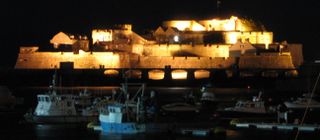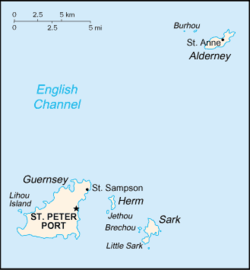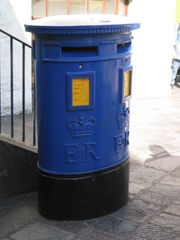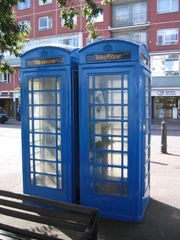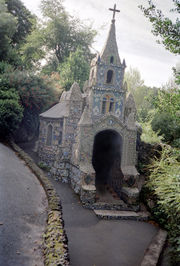Guernsey
2007 Schools Wikipedia Selection. Related subjects: Geography of Great Britain
| Bailiwick of Guernsey Bailliage de Guernesey |
|||||
|
|||||
| Anthem: God Save the Queen (official) Sarnia Cherie (official for occasions when distinguishing anthem required) |
|||||
| Capital | St Peter Port | ||||
|---|---|---|---|---|---|
| Official languages | English (predominant) French (legislative) Dgèrnésiais recognised as regional language. |
||||
| Government | British crown dependency | ||||
| - Head of state | Queen Elizabeth II | ||||
| - Lt. Governor | Sir Fabian Malbon | ||||
| - Bailiff | Geoffrey Rowland | ||||
| - Chief Minister | Laurie Morgan | ||||
| Independence | British crown dependency | ||||
| - Separation from mainland Normandy |
1204 | ||||
| - Liberation from Nazi Germany |
9 May 1945 | ||||
| Area | |||||
| - Total | 78 km² ( 223rd) 30.1 sq mi |
||||
| - Water (%) | 0 | ||||
| Population | |||||
| - July 2005 estimate | 65,228 ( 208th) | ||||
| - Density | 836.3/km² ( 12th2) 2,166/sq mi |
||||
| GDP ( PPP) | 2003 estimate | ||||
| - Total | $2.59 billion ( 176th) | ||||
| - Per capita | $40,000 ( 5th (2003 estimate)) | ||||
| HDI (n/a) | n/a (n/a) ( n/a) | ||||
| Currency | Pound sterling1 ( GBP) |
||||
| Time zone | GMT ( UTC) | ||||
| - Summer ( DST) | ( UTC+1) | ||||
| Internet TLD | .gg | ||||
| Calling code | +44-1481 | ||||
| 1 The States of Guernsey issue their own sterling coins and banknotes (see Guernsey pound). 2 Rank based on population density of Channel Islands including Jersey. |
|||||
The Bailiwick of Guernsey (French: Bailliage de Guernesey) is a British crown dependency in the English Channel off the coast of Normandy.
As well as the island of Guernsey itself, it also includes Alderney, Sark, Herm, Jethou, Brecqhou, Burhou, Lihou and other islets. The island of Guernsey is divided into 10 parishes. Together with the Bailiwick of Jersey, it is included in the collective grouping known as the Channel Islands. Guernsey belongs to the Common Travel Area.
History
Rising sea levels transformed Guernsey into the tip of a peninsula jutting out into the emergent English Channel until about 6000 BC, when Guernsey and other promontories were cut off from continental Europe, becoming islands. At this time, Neolithic farmers settled the coasts and created the dolmens and menhirs that dot the islands. The island of Guernsey contains three sculpted menhirs of great archaeological interest; the dolmen known as L'Autel du Dehus also contains a dolmen deity.
During their migration to Brittany, the Britons occupied the Lenur Islands (former name of the Channel Islands) including Sarnia or Lisia (Guernsey) and Angia (Jersey). It was formerly thought that the Island's original name was Sarnia, but recent research indicates that may have been the Latin name for Sark; though Sarnia remains the island's traditional designation. Coming from the kingdom of Gwent, Saint Sampson (abbot of Dol, in Brittany) is credited with the introduction of Christianity to Guernsey.
In 933 the islands, formerly under the control of the kingdom, then Duchy of Brittany were annexed by the Duchy of Normandy. The island of Guernsey and the other Channel Islands represent the last remnants of the medieval Duchy of Normandy. In the islands, Elizabeth II's traditional title as head of state is Duke of Normandy.
During the English Civil War, Guernsey sided with Parliament, while Jersey remained Royalist. Guernsey's decision was mainly related to the higher proportion of Calvinists and other Reformed churches, as well as Charles I's refusal to take up the case of some Guernsey seamen who had been captured by the Barbary corsairs. The allegiance was not total, however, there were a few Royalist uprisings in the Southwest of the island, while Castle Cornet was occupied by the then Governor, Sir Peter Osbourne, and Royalist troops. Castle Cornet was the last Royalist stronghold to capitulate, in 1651.
During the wars with France and Spain during the 17th and 18th centuries, Guernsey shipowners and sea captains exploited their proximity to mainland Europe, applying for Letters of Marque and turning their trading vessels into privateers.
The 19th century saw a dramatic increase in prosperity of the island, due to its success in the global maritime trade, and the rise of the stone industry. One notable Guernseyman, William Le Lacheur, established the Costa Rican coffee trade with Europe.
During World War I approximately 3,000 island men served in the British Expeditionary Force. Of these, about 1,000 served in the Royal Guernsey Light Infantry regiment which was formed from the Royal Guernsey Militia in 1916.
The Bailiwick of Guernsey was occupied by German troops in World War II. Before the occupation, many Guernsey children were evacuated to England to live with relatives or strangers during the war. Some children were never re-united with their families. During the occupation, some people from Guernsey were deported by the Germans to camps in the southwest of Germany, notably to Biberach an der Riss and interned in the Lindele Camp ("Lager Lindele"). There was also a concentration camp built in Alderney where forced labourers, predominantly from Eastern Europe, were kept. It was the only concentration camp built on British soil and is commemorated on memorials under the Alderney's name in French: 'Aurigny'.
According to some reports, Guernsey was the second most heavily fortified island in occupied Europe during WWII with German defences dotted all round the coast and German additions to Castle Cornet. Certainly, the Channel Islands as a whole were the most fortified area in occupied Europe. Most of the German fortifications still remain intact and the majority of them are open for the public to explore (some having been renovated) with the exception of the Mirus Battery and some privately owned bunkers.
Politics
The States of Guernsey, officially called the States of Deliberation, consists of 45 People's Deputies, elected from multi- or single-member districts every four years. There are also two representatives from Alderney, a self-governing dependency of the Bailiwick, but Sark sends no representative. There are also two non-voting members - the Attorney General and the Solicitor General both appointed by the monarch.
Laws made the States are known as Projet(s) de Loi before they are passed and Loi or Law(s) afterwards (e.g. The Human Rights (Bailiwick of Guernsey) Law 2000.
A Projet de Loi is the equivalent of an English Bill , and a Law is the equivalent of an English Act of Parliament. Laws have no effect until promulgated as Orders-in-Council of the Crown. They are given the Royal Sanction at regular meetings of the Privy Council in London after, which they are returned to the Islands for formal registration at the Royal Court.
The States also make delegated legislation known as 'Ordinances (Ordonnances)' and 'Orders (Ordres)' which do not require Royal Assent. Commencement orders are usually in the form or Ordinances.
The Lieutenant Governor is the representative of the Crown. The official residence of the Lieutenant Governor is Government House. Since 18 October 2005 the incumbent is Vice-Admiral Sir Fabian Malbon, born in Southsea, Portsmouth in 1946 and a serving naval officer 1965-2002. His last naval posting before retirement from the Royal Navy was deputy commander-in-chief of fleet.
Each parish is administered by a Douzaine. Douzeniers are elected for a six year mandate, two Douzeniers being elected by parishioners at a Parish Meeting in November each year. The senior Douzenier is known as the Doyen. Two elected Constables carry out the decisions of the Douzaine, serving for between one and three years. The longest serving Constable is known as the Senior Constable and his or her colleague as the Junior Constable.
The legal system is Guernsey customary derived from Norman French customary law, heavily influenced and overlaid by English common law, justice being administered through a combination of Magistrates Court and the Royal Court. The legal profession is fused - there is no difference between solicitors and barristers as in England: Guernsey Advocates fulfil both roles. The Royal Court is presided over by the Bailiff and 12 Jurats (a permanent elected jury), the ultimate court of appeal being the Judicial Committee of the Privy Council.
Several European countries have consulate presence in the island. The French Consulate is based at Victor Hugo's former residence at Hauteville House. The German and Swiss Consulates are based in offshore bank branches of Credit Suisse and Fortis MeesPierson.
Geography
At , Alderney, Guernsey, Herm, Sark, and some other smaller islands have a total area of 30 square miles (78 km²) and a coastline of about 30 miles (50 km). By itself, the island of Guernsey has a total area of 25 square miles (63 km²). Guernsey is situated 30 statute miles (48 km) west of France's Normandy coast and 75 statute miles (121 km) south of Weymouth in England and lies in the Gulf of St Malo. Lihou, a tidal island, is attached to Guernsey by a causeway at low tide. The terrain is mostly level with low hills in southwest.
Elevation varies from sea level to 375 feet (114 m) at Le Moulin on Sark. The highest point in mainland Guernsey is Hautnez (363 ft; 110 m), in Alderney at Le Rond But (306 ft; 93 m), in Jethou (248 ft; 75.6 m) and Herm (322 ft; 98 m). Natural resources include cropland.
Guernsey itself contains two main geographical regions, the Haut Pas, a high southern plateau, and the Bas Pas, a low-lying and sandy northern region. In general terms, the Haut Pas is the more rural of the two, and the Bas Pas is more residential and industrialised.
There is a large, deepwater harbour at St Peter Port.
The climate is temperate with mild winters and cool sunnier summers. The hottest months are August and September where temperatures are generally around 26 °C (79 °F). On average, the coldest month is February with an average weekly mean air temperature of 6°C. Average weekly mean air temperature reaches 16°C in August. Snow rarely falls and is unlikely to settle, but is most likely to fall in February. The temperature rarely drops below freezing, although strong wind-chill from Arctic winds can sometimes make it feel like it. The wettest months in terms of rainfall are on average December (average 108mm), November (average 98mm) and January (average 89mm). July is on average the sunniest month with 250 hours recorded sunshine; December the least with 50 hours recorded sunshine. 50% of the days are overcast.
The Casquets, a group of islets, are notable for the lighthouse facility constructed there.
The island of Guernsey is divided into ten parishes (the parish of St Anne, Alderney is not generally included in the enumeration of parishes in the Bailiwick):
| Map | Parish | Population (2001) |
area ( vergees) |
area (km²) |
area ( sq. mi) |
|---|---|---|---|---|---|
| 1 | Castel | 8,975 | 6,224 | 10.200 | 3.938 |
| 2 | Forest | 1,549 | 2,508 | 4.110 | 1.587 |
| 3 | St Andrew | 2,409 | 2,752 | 4.510 | 1.741 |
| 4 | St Martin | 6,267 | 4,479 | 7.340 | 2.834 |
| 5 | St Peter Port | 16,488 | 4,074 | 6.677 | 2.578 |
| 6 | St Pierre du Bois | 2,188 | 3,818 | 6.257 | 2.416 |
| 7 | St Sampson | 8,592 | 3,687 | 6.042 | 2.333 |
| 8 | St Saviour | 2,696 | 3,892 | 6.378 | 2.463 |
| 9 | Torteval | 973 | 1,901 | 3.115 | 1.203 |
| 10 | Vale | 9,573 | 5,462 | 8.951 | 3.456 |
Economy
Unlike many countries Guernsey has not delegated money-creation to the central bank and has instead issued interest-free money since 1816. As a result the government has not had to use increasing amounts of tax revenue to repay debt to the central bank, which has led to low income tax rates, no goods and services tax and no capital gains tax.
Financial services - banking, fund management, insurance, etc. - account for about 55% of total income in this tiny Channel Island economy. Tourism, manufacturing, and horticulture, mainly tomatoes and cut flowers especially freesias have been declining. Light tax and death duties make Guernsey a popular offshore finance centre. However, the evolving economic integration of the European Union nations is changing the rules under which Guernsey operates. Guernsey is currently changing the way its tax system works in order to remain internationally competitive, and is confronting what it terms a financial "black hole" of just over forty five million pounds accoding to some estmates. Guernsey now has the official ISO 3166-1 alpha-2 code GG and the official ISO 3166-1 alpha-3 code GGY; market data vendors, such as Bloomberg, will report products related to Guernsey using the alpha-3 code.
Guernsey issues its own sterling coinage and banknotes. UK coinage and English and Scottish banknotes also circulate freely and interchangeably.
Public services, such as electricity, telecommunications and postal services have been privatised by the States and are now operated by companies. The Post Office (Guernsey Post Limited) and Electricity Board (Guernsey Electricity Limited) are wholly owned by the States whilst telecommunications are operated by independent companies, Cable & Wireless Guernsey and Wave Telecom. Gas is suppplied by an independent private company. Both the Guernsey Post post boxes and the telephone boxes are painted blue, but otherwise are identical to their British counterparts, the red pillar box and red telephone box.
Ports and harbours exist at St Peter Port and St Sampson's. There are two paved airports in the bailiwick ( Guernsey Airport and Alderney Airport), and 3 miles (5 km) of railways in Alderney.
The Guernsey Railway, which was virtually an electric tramway, and which began working on 20 February 1892, was abandoned on 9 June 1934. It replaced an earlier transport system which was worked by steam, and was named the Guernsey Steam Tramway. The latter began service on 6 June 1879 with six locomotives. This leaves Alderney as the only Channel Island with a working railway.
- [Notes on the Railway taken from The Railway Magazine, September 1934 edition]
Demographics
The population is 65,031, as of 2004. The median age for males is 39.6 years and for females is 41.5 years. The population growth rate is 0.31% with 9.16 births/1,000 population, 9.87 deaths/1,000 population, and 3.84 migrant(s)/1,000 population. The life expectancy is 77.17 years for males and for females. 1.38 children are born per woman. Ethnic groups consist of British and Norman-French descent, Portuguese and increasingly, Latvian. The Anglican, Roman Catholic, Presbyterian, Baptist, Congregational, and Methodist religions are practised, the most common being the Anglicans and Methodists.
For immigration and nationality purposes the United Kingdom generally treats Guernsey as though it were part of the UK; however, Guernsey is constitutionally entitled to restrict immigration by non-Guernsey residents and maintains its own immigration and border controls.
The housing market is split between local market properties and a small number of open market properties. Anyone may live in an open market property, but local market properties can only be lived in by those who qualify - either through being born in Guernsey, by obtaining a housing licence, or by virtue of sharing a property with someone who does qualify.
Housing licences are for fixed periods, and are usually only valid for as long as the individual remains employed by a specified Guernsey employer.
These restrictions apply equally regardless of whether the property is owned or rented, and only applies to occupation of the property. Thus a person whose housing licence expires may continue to own a Guernsey property, but will no longer be able to live in it.
There are a number of routes to qualifying as a "local" for housing purposes. Generally it is sufficient to be born in Guernsey, or to at least one Guernsey parent, and to live in the island for ten years in a twenty year period. Once "local" status has been achieved it remains in place for life. Even a lengthy period of residence outside Guernsey does not invalidate "local" housing status. More details may be obtained from the States Housing Control Department.
Although Guernsey's inhabitants are full British citizens, an endorsement restricting the right of establishment in other European Union states is placed in the passport of British citizens connected solely with the Channel Islands and Isle of Man. Those who have a parent or grandparent born in the United Kingdom itself (England, Scotland, Wales and Northern Ireland), or who have lived in the United Kingdom for 5 years, are not subject to this restriction.
Education
Guernsey adopts mainly the United Kingdom's National Curriculum, including the use of the GCSE and A Level system, in terms of content and structure of teaching. Children are allocated a primary school on a basis of catchement area, or are allowed to attend either two Catholic primary schools. In terms of admissions however the island continues to use the 11 plus exam to decide on whether a child should receive education at the Grammar School, or receive state funded places at the independent schools Elizabeth College for boys, and The Ladies College for girls or Blanchelande Girls College for Roman Catholics. Parent have the choice to send children to independent schools as fee payers. For children who are not selected for the Grammar School or colleges, they attend the secondary schools of La Mare de Carteret Secondary School, Les Beaucamps School, St Peter Port School and St Sampson's School.
In 2001 along with planned redevelopment of secondary schools the then Education Council tried unsuccessfully abolish this system. Nevertheless the there is now a planned redevelopment of state schools across the island, however most of the plan is subjected to securing state funding.
Post GCSE students have a choice of transferring to the state run The Grammar School and Sixth Form Centre, or to the independent colleges for academic AS/A Levels. Or subjects more vocationally at the islands Guernsey College of Further Education.
There are no established universities on the island. Instead students have to go to the United Kingdom to receive state support towards maintenance and tuition fees. Recently however, the States of Guernsey Education Department has proposed the introducion of student loans due to the black hole deficit in state spending in 2008, for middle and upper income earners. This has meet with some opposition by local politicians and students who argue that it will deter future students from going and returning from university, due to high housing and living costs. The department argues that it had no choice but introduce them. It is to be decided by November. However the decision has been deffered until 2009, with postgraduate funding being restored.
Culture
English is the only language spoken by a majority of the population, while Dgèrnésiais, the Norman language of the island, is currently spoken fluently by 2% of the population (according to 2001 census). However, 14% of the population claim some understanding of the language and it is taught in a few Island schools. Until the early 20th century French was the only official language. Family and place names reflect this linguistic heritage. Portuguese is taught in a few schools and is spoken by around 2% of the population.
Victor Hugo wrote some of his best-known works while in exile in Guernsey, including Les Misérables. His home in St Peter Port, Hauteville House, is now a museum administered by the city of Paris. In 1866, he published a novel set in the island, Travailleurs de la Mer ( Toilers of the Sea), which he dedicated to the island of Guernsey.
The most well-known novel by a Guernseyman is The Book of Ebenezer Le Page, by GB Edwards which, in addition to being a critically-acclaimed work of literature, it also contains a wealth of insights into life in Guernsey during the 20th century.
The national animals of the island of Guernsey are the donkey and the Guernsey cow. The traditional explanation for the donkey (âne in French and Dgèrnésiais) is the steepness of St Peter Port streets that necessitated beasts of burden for transport (in contrast to the flat terrain of the rival capital of St Helier in Jersey), although it is also used in reference to Guernsey inhabitants' stubbornness. The Guernsey cow is a more internationally famous icon of the island. There is also a breed of goat known as the Guernsey goat, which is distinguished by its golden-coloured coat .
Guernsey people are traditionally nicknamed donkeys or ânes, especially by Jersey people (who in turn are nicknamed crapauds - toads). Inhabitants of each of the parishes of Guernsey also have traditional nicknames, although these have generally dropped out of use among the English-speaking population.
The Guernsey Lily Nerine sarniensis (Sarnia is the traditional name of the island of Guernsey in Latin) is also used as a symbol of the island.
A local delicacy is the ormer (Haliotis tuberculata) - a variety of abalone harvested from the beach at low spring tides.
In July 2006 smoking in enclosed public places was banned, a law put in place to protect workers' right to a healthy working environment.
Sport in Guernsey
Guernsey participates in its own right in the Commonwealth Games.
Guernsey participates in the Island Games, which it hosted in 2003. In sporting events in which Guernsey does not have international representation, when the British Home Nations are competing separately, islanders that do have high athletic skill may choose to compete for any of the Home Nations - there are, however, restrictions on subsequent transfers to represent another Home Nation. The football player Matt Le Tissier for example, tried out for the Scotland national football team but ended up playing for England.
The island's traditional colour (e.g. for sporting events) is green.
Guernsey has recently been declared an affiliate member by the International Cricket Council (ICC).
Famous Guernsey people
The following famous people were born in Guernsey:
- James Saumarez (1757-1836), Vice Admiral of the Blue and first Baron de Saumarez.
- Sir Isaac Brock (1769-1812), hero of Upper Canada.
- Thomas de la Rue (1793-1866), printer and stationer.
- Warren de la Rue (1815-1889), astronomer and chemist.
- William Le Lacheur (1802-1863), sea captain and merchant.
- Arthur Maurice Hocart (1883-1939), anthropologist.
- Wilfred Hansford Gallienne (1897-1956), British Ambassador to Cuba.
- Gerald Basil Edwards (1899-1976), author of The Book of Ebenezer Le Page.
- Roy Dotrice (born 1923), actor; and his daughters, actresses Michele Dotrice (born 1948) and Karen Dotrice (born 1955).
- John Savident (born 1938), actor in Coronation Street.
- Andrew Lawrence-King (born 1959), baroque harpist, director of The Harp Consort.
- Sarah Montague (born 1966), BBC journalist and news presenter.
- Matt Le Tissier (born 1968), retired Southampton FC and England footballer.
- Andy Priaulx (born 1974), motor racing driver and reigning World Touring Car Champion for BMW Team UK.
- Dave Higgs (born 1985), Trials Bike Champion 2000, 2001, 2002



